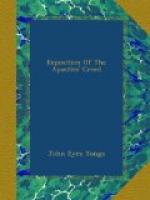Standing at the end of the Creed, this article expresses the consummation of the work accomplished for man by the Three Persons of the Godhead. The Father created man and breathed into his nostrils the breath of life, that he might glorify God and enjoy Him for ever; and when, through the fall, man had forfeited the gift of life, God spared not His own Son, that, through His dying, pardon and blessed life might be brought within the reach of the fallen; the Son assumed human nature and suffered and died, that He might deliver men from death, temporal and eternal, and procure for them everlasting life; the Holy Ghost, the Giver of life, sanctifies the believer and makes him meet for the inheritance of the saints. All the means of grace were given for the purpose of convincing and converting men, and of preparing them for entrance into and enjoyment of the blessed life in eternity.
The Everlasting Life of the Creed covers more than the immortality of the soul. Even heathens grasped in some measure the fact that the spirit of man survives separation from the body; but life for the body in reunion with the soul is a doctrine of revelation. In the Pagan world various conflicting beliefs were held as to the condition of men after death. Some thought that existence terminated at death; others that men then lost their personality and were absorbed into the deity; and others that the spirit was released by death and then entered on a separate existence, possessed of personality and capable of enjoyment; but of the Christian doctrine of resurrection-life for soul and body in abiding reunion they were altogether ignorant. Those consolations which Christianity brings to the mourner were unknown. There is an interesting letter extant which was written to Cicero, the Roman orator, by a friend who sought to comfort him after the death of his daughter Julia, in which the consolation tendered strikingly marks the distinction between Pagan and Christian views regarding death. Cicero was reminded by his friend that even solid and substantial cities, such as those whose ruined remains were to be seen in Asia Minor, were doomed to decay and destruction; and if so, it could not be thought that man’s frail body can escape a similar experience. This is poor comfort in comparison with the hope of glory which sustains the Christian under trial. He knows not only that his soul shall live for ever, but that the life of eternity is one in which the body too, then incapable of pain, weariness, or death, shall have part. “We know that if our earthly house of this tabernacle were dissolved, we have a building of God, an house not made with hands, eternal in the heavens."[238]
Everlasting existence after resurrection will be the portion of the righteous and the wicked. Attempts have been made to explain away various emphatic Scripture statements regarding the doom of the ungodly, with the view of lessening its terrors; but, if we are to accept the plain meaning of these statements, there seems to be no reasonable interpretation of them which gives sanction to the belief that this doom can be escaped.




